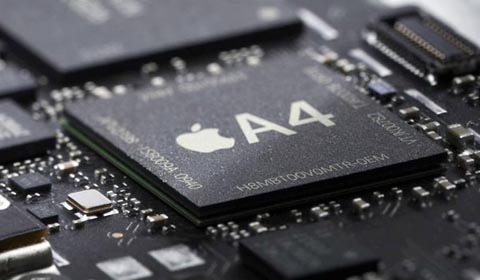Whether Apple's iPad will be a hit or miss for business is yet to be decided. But one thing is for sure: Apple's iPad A4 chip is turning heads in the IT world. If you're a mobile VAR with ties to Apple, Intel or Qualcomm, you should pay particularly close attention. Here's why.
February 4, 2010


Apple A4 processor iPad
Whether Apple’s iPad will be a hit or miss for business is yet to be decided. But one thing is for sure: Apple’s iPad A4 chip is turning heads in the IT world. If you’re a mobile VAR with ties to Apple, Intel or Qualcomm, you should pay particularly close attention. Here’s why.First, some background on Apple’s A4 chip. Turn the wayback dial to April 2008: Apple buys chip maker PA Semi. Speculation runs rampant on what Apple plans for the the new acquisition; was it for a new iPhone CPU? A Tablet CPU?
Turns out, they’re all true. Apple is pretty heavy into designing its own silicon, and it comes at no surprise since once upon a time, PowerPC processors were initially backed by IBM, Motorola and Apple. Not to mention, the iPhone CPU has a few touches of Apple magic in it too.
Holding All the Chips?
But now that Apple has a fully blown chip-design team in-house, there’s really no stopping them from going back to the days of custom-tailored processors. Which is good for Apple and Steve Jobs’ control machine — but potentially bad for Intel and Qualcomm, which promote offerings like the Atom and Snapdragon.
BusinessWeek detailed some of the industry’s reactions:
“Apple’s done a nice job innovating with their vertically integrated device,” said Bill Calder, an Intel spokesman. “But we remain confident that the Intel architecture will fuel broad growth in a wide range of intelligent devices from tablets to smartphones.”
BusinessWeek also picked the brains of Will Strauss, an analyst for Forward Concepts Co, a silicon study company.
Making a processor run quickly without draining the battery is the biggest challenge Intel faces in cracking the mobile market, Strauss said. While he estimates that Apple will sell only 2 million iPads this year, being left out of an attention-grabbing device is the biggest loss for Intel, he said. “The only loser there is that Intel doesn’t have another feather in its cap,” he said.
Qualcomm wasn’t actually quoted, nor had anything to say directly, but a spokeswoman said Qualcomm is pleased to be working with 15 manufacturers.
Next Moves
Admittedly, Apple most likely won’t likely offer the A4 outside its ‘walled garden,’ so don’t expect to see third-party A4 devices running Google Android anytime soon.
Still, Intel and Qualcomm have to step it up a notch, since the A4 represents real competition. In my opinion: When Apple closely integrates hardware and software, the experience is nearly always superior to anything else cobbled together on the market.
The iPad allegedly offers a 10 hour battery life, and most pundits agree that it required a custom chip (the A4) to deliver that type of lasting power. Can Intel or Qualcomm deliver a 10 hour power-efficient CPU without the close knit control between operating system and hardware?
It’ll be interesting to see if Apple starts to make moves beyond the mobile CPU, and drift back towards custom chips for Macintosh computers.
Hey, it’ll certainly solve the Hackintosh problem.
About the Author(s)
You May Also Like


